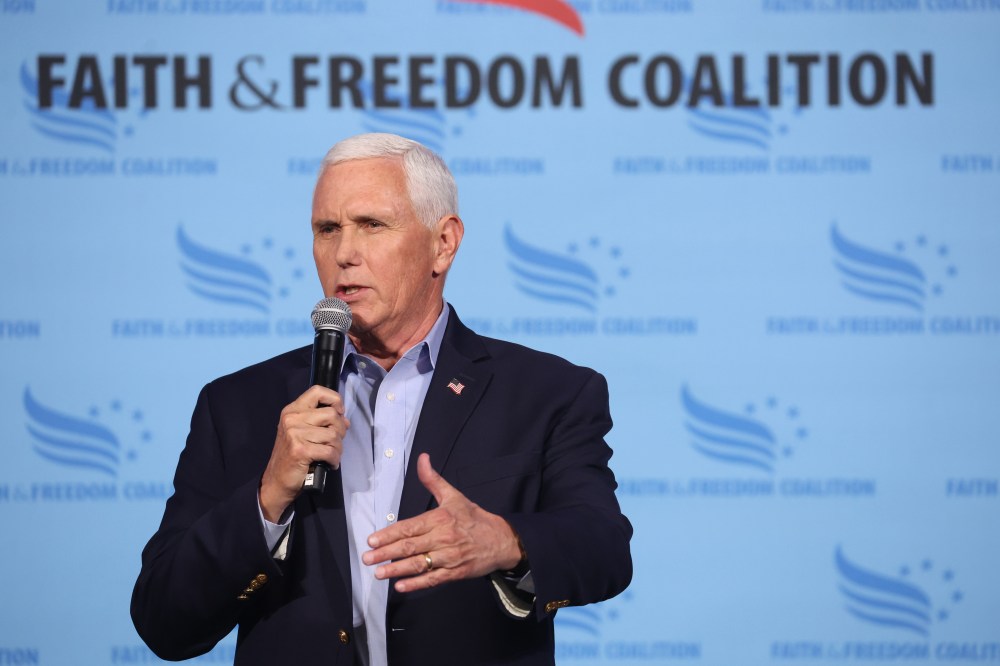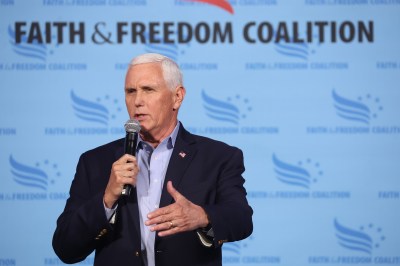Happy Wednesday! If you’ve always wanted to buy official campaign merchandise of Joe Biden shooting laser beams out of his eyes, have we got good news for you.
Up to Speed
- It’s official: President Joe Biden is running for reelection. In a video posted to Biden’s campaign accounts Tuesday, the president cast the 2024 election as the second round of a battle to protect America’s “bedrock freedoms” from “MAGA extremists.” “Let’s finish this job—I know we can,” Biden said in the video. “Because this is the United States of America, and there’s nothing, simply nothing, we cannot do if we do it together.” On Wednesday, the Biden campaign unveiled its first television advertisement, a largely positive, glossy spot wrapped in the American flag—aptly titled, "Flag,"—running in Arizona, Georgia, Michigan, Nevada, Pennsylvania and Wisconsin.
- If elected, does Biden intend to serve a full second four-year term? “I’m just not going to get ahead of the president,” White House press secretary Karine Jean-Pierre told reporters Tuesday. “That’s something for him to decide.” Jean-Pierre later tweeted that her noncommittal answer had been an attempt not to engage in campaign communications from her official White House perch; if reelected, she added, Biden “would serve all 8 years.”
- The 2024 endorsements keep rolling in for former President Donald Trump, who on Tuesday locked up a notable Senate Republican: Montana Sen. Steve Daines, who chairs the important National Republican Senatorial Committee. Many Republican strategists believe that Trump’s heavy participation in Senate primaries last year led to the nomination of a weak slate of candidates that helped Democrats maintain control of the Senate in the midterm elections.
- Meanwhile, the Trump campaign is up on TV nationwide with its first ad of the 2024 cycle—one that takes direct aim at Trump’s prospective opponent Florida Gov. Ron DeSantis. The ad argues that Trump’s endorsement saved DeSantis’s career during his first run for governor in 2018, showing clips of old ads in which DeSantis read Trump lawn signs and portions of The Art of the Deal to his young children. “Isn’t it time DeSantis remembers how he got to where he is?” the narrator intones. “Truth is, there’s only one person who can make America great again.”
- Monday was a momentous day for high-profile cable news turnover: Tucker Carlson of Fox News and Don Lemon of CNN were both released by their respective networks within the span of a few hours. Carlson’s firing comes shortly after Fox agreed to pay $787.5 million to Dominion Voting Systems over false claims made on the network in the wake of the 2020 election, but some reports suggest Carlson’s ouster had more to do with a lawsuit from a former Fox producer, Abby Grossberg, who accused Carlson and his team of fostering a hostile work environment.* Lemon, meanwhile, had struggled through a number of faux pas after moving from prime time to CNN’s morning lineup, including a recent incident where he was temporarily suspended after arguing on air the that Republican presidential candidate Nikki Haley was “past her prime.”
- Truckloads of cash from entrepreneur Peter Thiel helped shape the slate of GOP candidates in last year’s midterm elections, but the right-wing billionaire is reportedly stepping away from politics this cycle.
Mike Pence’s 2024 Bet: There’s Life in Fusionism Yet
Here’s the conventional wisdom on the right these days: The Trump era showed that the old conservative policy program—fusionism to its old friends, “Zombie Reaganism” to its recent enemies—is an electoral dead end. But as he mulls a run for president, former Vice President Mike Pence is arguing that rumors of fusionism’s death may be exaggerated—even among the MAGA base that supposedly deposed it.
“All I can tell you is, I spoke at more Trump rallies than I can remember—generally just before the headliner,” Pence told the Dispatch Podcast in an extensive interview this week. “And I talked about a strong national defense, about American leadership in the world, about standing with our allies, standing up to enemies. I talked about less taxes, less regulation, American growth, fiscal responsibility. I talked about conservatives on our courts, traditional values. And look, I may not be the most scintillating speaker in the world, but the roof blew off every time I talked about these things.”
“This is a movement,” Pence said, “that I believe in my heart of hearts is still animated by the same things.”
We’ll find out soon if that’s true. The political operations of the current Republican frontrunners, Donald Trump and Ron DeSantis, have spent the early days of the cycle racing away from old conservative orthodoxy on economic issues—and trying to outpace each other. Trump and his supporting MAGA PAC have accused DeSantis of harboring a secret desire to slash Medicare and Social Security benefits; DeSantis has denied this, while a PAC that supports him has resurfaced an old clip of Trump saying that he’d take a look at entitlement cuts “at some point” in a second term.
But Pence argued that Republicans need to recapture their confidence that fiscal prudence can be a winning message. He related the story of how, while serving in Congress during the George W. Bush years, he initially faced blowback in his district from seniors over his endorsement of Bush’s plan to partially privatize Social Security:
“I had a thousand people gathered at a nursing home waiting to talk to me. And I stood up and I just explained, number one, this has nothing to do with anyone in this room,” Pence said. “But for younger Americans, for your grandkids, for your kids, we’ve just gotta make the system whole. We’ve gotta fix it so it’s there for them. I was reelected in 2006—which was a tough year anyway—resoundingly. We got tremendous support.”
The challenges he and Bush were trying to tackle, Pence said, have not gone away in the intervening years. “The immense growth of entitlements actually threatens our ability to provide support in traditional anti-poverty programs, traditional infrastructure, and most importantly it continues to crowd out our ability to provide for the national defense. We just have to do it.”
The full Dispatch Podcast interview with Pence will be available later today.
‘It’s Tricky’: What Beats Trump in a GOP primary?
Losing didn’t do it. Fomenting a riot at the Capitol and attempting to overturn an election didn’t do it. Indictment, and the threat of more indictments, didn’t do it. If you’re a Republican contending for the 2024 presidential nomination, what do you say to beat Donald Trump?
“That’s the million dollar question, right?” said Alex Conant, a Republican operative in Washington. “There’s no silver bullet message.”
Conant has experienced this strategic dilemma firsthand. In 2016, during Trump’s first GOP primary, he was a senior communications adviser to a rival, Sen. Marco Rubio of Florida. Nearly eight years later, the former president might be a diminished political figure. Yet in competition for the White House versus other Republicans, it seems not much has changed.
Trump is the strong frontrunner for the nomination despite a litany of disadvantages: losing reelection to President Joe Biden; leading his party to disappointing finishes in three consecutive national elections, punctuated by Democratic overperformance in 2022; his role in the events of January 6; his mounting legal woes; his age (he turns 77 in June); and the fact that he would be a termed-out, lame-duck president even if he overcame the odds to win the 2024 general election.
Some Republican insiders supporting Trump’s current and likely primary opponents are watching this dynamic unfold with dread and befuddlement. Even if the former president’s rivals follow the advice of many GOP strategists and mount sustained, head-on attacks—similar to how Trump treats competitors—those same GOP strategists aren’t sure which attacks will pry grassroots Republicans away from Trump. In interviews with The Dispatch, they offered recommendations, but little consensus.
“It’s tricky,” said a Republican consultant in the Midwest. “He is vulnerable on not being able to win again. But the base doesn’t want to hear about how you can win among squishy moderates. ‘They won’t let him win’ can be effective. But if ‘they’ will let you win, maybe you aren’t so great. You have to convince them you can stand up to ‘them’ as well or better than Trump did.”
“You have hit on the main problem,” a Republican pollster added. “Ideologically, to contend with Trump, your message has to be smack-dab in the middle of conservative populism—just like Trump. But how do you differentiate? How do you draw a contrast that favors you over Trump?”
This is the conundrum facing the other Republicans seeking the nomination. According to the RealClearPolitics polling average, Trump leads among GOP primary voters nationally with 51.3 percent support, followed by Florida Gov. Ron DeSantis at 23.6 percent, former Vice President Mike Pence at 4.5 percent, and former South Carolina Gov. Nikki Haley at 4.1 percent.
Most Republican strategists agree that any GOP candidate who hopes to defeat Trump has to punch him in the mouth. Committed primary voters want a fighter—a standard-bearer they trust to take on the Democrats, the media, foreign adversaries, large corporations and (especially) Republicans in Washington prone to compromise.
“Someone has to approach this from the place of ‘bullying the bully,’” a Republican operative said. Other suggestions for undermining Trump from professional Republicans include:
- “Embrace the message but shoot the messenger. Lame duck on day one, old, costs us Congress and can’t win,” a party insider in New Hampshire said.
- “Hit him on the ‘big beautiful’ vaccine. It’s perfect, because he created it but primary voters don’t agree. Trump also did nothing to stop explosive DEI growth while president and the anger around that is massive,” a party insider in Ohio said.
But doubts abound that any of these messages can sway GOP voters, and some wonder if standing up to Trump will move the needle at all.
That’s because the 45th president brings certain attributes to the table difficult to compete with, or replicate. Republican primary voters are well aware of his flaws and many don’t care—or don’t buy them. Indeed, according to fresh polling from Morning Consult, Republican voters nationally believe Trump is their most electable option versus Biden.
And even if Republican voters harbor doubts, Trump benefits from what one GOP campaign guru describes as a “hierarchy of values.” Primary voters value “relentless confrontation with Democrats” and a determination not to let the GOP regress into the party it was before Trump. Satisfy these concerns, and maybe Republican voters will entertain arguments questioning the former president’s electability.
“Trump is an apex predator,” this Republican said. “It’s understated how much Republican primary voters hate the political system—including the Republican Party. Anyone who succeeds Trump will also show disdain for the Republican Party, and that’s something that does not come natural to them.”
Eyes on the Trail
- Haley Zigzags on Abortion. Nikki Haley wants to achieve national consensus on abortion. Consensus around what? The Republican presidential contender didn’t say Tuesday during a “major policy speech” on this bitterly polarizing issue. “No one talks about finding consensus,” Haley said during a roughly 20-minute address, from the headquarters of Susan B. Anthony Pro-Life America in Alexandria, Virginia. “How many weeks are you for? How many exceptions are you for? And the list goes on. But these questions miss the point if the goal is about saving as many lives as possible. You don’t save any lives if you can’t enact your position into law. And you can’t do that unless you find consensus.” Haley compared her approach to abortion to the successful effort she led as South Carolina governor to remove the Confederate flag from the state capitol. But in the aftermath of the Supreme Court striking down federal protections for abortion rights, it’s exactly those questions—For how many weeks of pregnancy should abortion be legal? Should exceptions be made in cases of rape, incest and the mother’s life or health?—that are dominating the race for the White House and driving the choices voters are making. They are questions Haley is going to have to answer. Meanwhile, Democrats wasted little time in answering them for her. In a statement, the Democratic National Committee called Haley “the latest MAGA Republican endorsing a national abortion ban.”
Notable and Quotable
“So, I think it’s very important, as you have heard from so many incredible leaders, for us at every moment in time, and certainly this one, to see the moment in time in which we exist and are present and to be able to contextualize it – to understand where we exist in the history and in the moment as it relates not only to the past but to the future.”
—Vice President Kamala Harris at a Howard University “Rally for Reproductive Rights,” Tuesday, April 25
*Correction, April 27, 2023: This newsletter originally misstated the total Fox News agreed to pay Dominion News Services to settle its defamation suit.








Please note that we at The Dispatch hold ourselves, our work, and our commenters to a higher standard than other places on the internet. We welcome comments that foster genuine debate or discussion—including comments critical of us or our work—but responses that include ad hominem attacks on fellow Dispatch members or are intended to stoke fear and anger may be moderated.
With your membership, you only have the ability to comment on The Morning Dispatch articles. Consider upgrading to join the conversation everywhere.